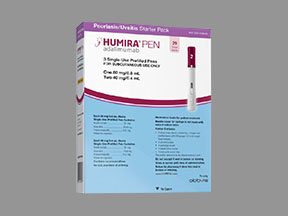
Humira-psoriasis/uveit Starter Coupons & Savings Card – Discount Prices from $4456.47
My prescription
Edit
80 MG/0.8ML &40MG/0.4ML, Humira-psoriasis/uveit Starter (1 Auto-injector Kit)
Select pharmacy

Albertsons
$4456.47
COUPON PRICE
Walgreens
$4782.46
COUPON PRICE
Walmart
$4797.96
COUPON PRICEHumira-psoriasis/uveit Starter savings card
Show this card to your pharmacist
Albertsons
$4456.47
BIN
ID
PCN
GRP
019876
LHCCA4CC19
CHIPPO
LHX
Powered by
Price history for Humira-psoriasis/uveit Starter
1 Auto-injector Kit, 80 MG/0.8ML &40MG/0.4ML
Average retail price for Humira-psoriasis/uveit Starter
Average SaveHealth price for Humira-psoriasis/uveit Starter
Our price history data is based on aggregated prescription data collected from participating pharmacies in America. Our prescription data updates daily to reflect the latest price changes. If you notice a missing data point, it means there wasn't sufficient data available to generate a monetary value for that date.
*Retail prices are based on pharmacy claims data, and may not be accurate when we don't have enough claims.
Humira-psoriasis/uveit Starter dosage forms
Dosage Quantity Price from Per unit 80 MG/0.8ML &40MG/0.4ML 1 Auto-injector Kit $4456.47 $4456.47 80 MG/0.8ML &40MG/0.4ML 2 Auto-injector Kits $8897.94 $4448.97 80 MG/0.8ML &40MG/0.4ML 3 Auto-injector Kits $13339.41 $4446.47
| Dosage | Quantity | Price from | Per unit |
|---|---|---|---|
| 80 MG/0.8ML &40MG/0.4ML | 1 Auto-injector Kit | $4456.47 | $4456.47 |
| 80 MG/0.8ML &40MG/0.4ML | 2 Auto-injector Kits | $8897.94 | $4448.97 |
| 80 MG/0.8ML &40MG/0.4ML | 3 Auto-injector Kits | $13339.41 | $4446.47 |
How much does the HUMIRA starter kit cost?
The cost of a HUMIRA starter kit can vary significantly based on factors such as insurance coverage, pharmacy location, and any available discounts or assistance programs. Without insurance, the price can be quite high, often exceeding several thousand dollars. Patients are encouraged to check with their insurance provider and explore patient assistance programs offered by the manufacturer to potentially reduce out-of-pocket costs.
Can HUMIRA trigger psoriasis?
Yes, while HUMIRA is used to treat certain types of psoriasis, it can paradoxically trigger or worsen psoriasis in some individuals. This is a known but uncommon side effect. If someone experiences new or worsening psoriasis symptoms while taking HUMIRA, they should consult their healthcare provider for evaluation and management.
Can Humira cure uveitis?
Humira (adalimumab) is not a cure for uveitis, but it can help manage and reduce the symptoms associated with the condition. It is used to control inflammation and prevent flare-ups, thereby helping to maintain vision and reduce discomfort. Treatment effectiveness can vary, and it is important for patients to follow their healthcare provider's recommendations for managing uveitis.
What foods should you avoid while taking HUMIRA?
There are no specific foods that need to be avoided while taking HUMIRA. However, it is important to maintain a balanced diet and follow any dietary recommendations provided by a healthcare provider. Patients should also be cautious about consuming alcohol, as it can interact with medications and affect overall health. If there are any concerns about diet or potential interactions, it is advisable to consult with a healthcare professional.
Is HUMIRA being discontinued?
As of the latest information available, HUMIRA is not being discontinued. It remains a widely used medication for various inflammatory conditions. However, patients should always consult with their healthcare provider for the most current information regarding their medications.
